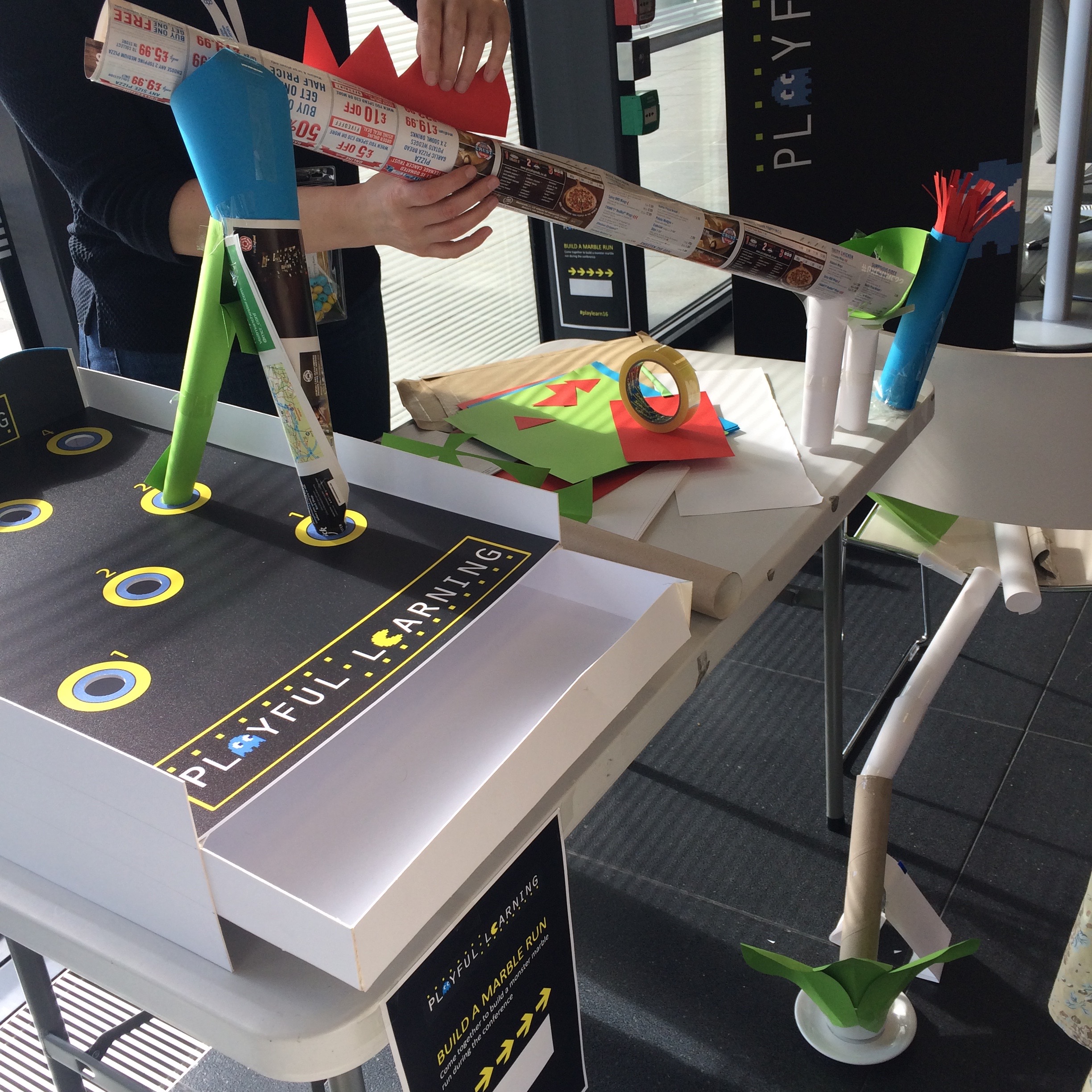Playful Learning – Failure and Forfeit

Stephanie (Charlie) Farley – Open Education Resource Advisor for EDE.
Last month I had the pleasure of attending the Playful Learning conference in Manchester. The conference was pitched as an “intersection of learning and play for adults” with the purpose of providing “a space where teachers, researchers and students could play, learn and think together”.
Unsurprisingly, active participation, experimentation, and engagement was encouraged from the get-go. This involved participation in a marble-run challenge to confirm one’s playfulness before registration on arrival. All attendees were also encouraged to sign up to an interactive game involving quests around the collecting, swapping, and earning of marbles.
The conference was even provided with its own villain in the form of Rosie Jones’ (Associate Director of library Services at Liverpool John Moores University) ‘Evil anti-play’ twitter account (Games and Learning NO Interest Group).
Powerfully, during the first keynote we were promptly (through the medium of pass the parcel) put into positions of having to forfeit and give-away the prized marbles we had only just begun to covet and prize. Failure and forfeit were to become strong themes throughout the conference.
When we play a game although we strive to achieve the win condition, it also creates a safe space where losing the game or forfeiting a prize can be experienced away from fear. Fear of failure, fear of not being taken seriously, fear of your work not being ‘good enough’ is something that comes up again and again in Higher Education, and particularly when I’m talking to people about opening up and sharing their content as Open Educational Resources.
In the session ‘These are a few of our favourite tools’ by Karenne Sylvester and Helen Reed we were introduced to a number of online gaming tools and quizzes (QR Codes, Blippar, Kahoot, and PollEverwehere were session favourites) that could be incorporated into a teaching environment. Helen found that many students would complete a passing mark for an online quiz and then race forward to the next quiz, however there were also students who valued the ability to go back and repeat the quiz over on their own until they were able to understand and correctly answer each and every question. These students were able to shake their fear of choosing a wrong answer as the online quiz provided a safe space to play, experiment, and further their understanding.
This makes sense. So much of life is falling over and picking ourselves up, we need our mistakes in order to learn. However, there’s also an element of curiosity in failure. What will happen if we don’t pass the test, if we make the ‘wrong’ choice? What are the consequences and what does it feel like to fail?
In the session ‘Playing against the game’ Bernd Remmele explored negative gaming and the motivations driving players who choose to actively pursue ‘wrong’ or ‘losing’ decisions. When queried, students who had chosen to play a game negatively responded that they ‘wanted to know when the company goes bankrupt’ or ‘what happens when my avatar is starving’. Additionally, when there were no consequences to negative actions, or no way to undo the damage/catch-up, the players were at risk of becoming bored and disengaging from the game.
In the presentation by Coventry University on their Game Changers Programme run in early 2016 we heard about their open six-week online gaming literacy programme which encouraged staff and students to create inter-disciplinary games. The programme itself was gamified and incorporated challenges, quests and badges with the aim of iteratively building upon ideas collaboratively across disciplines and between staff and students. Participation proved difficult when staff and students were hesitant to create outside of their known circles due to a fear of failure, that their ideas would be considered ‘silly’ and not academic enough. More on the programme can be found on their website here: http://dmll.org.uk/projects/game-changers/
Do we need to fail and to survive that failure in order to feel confident taking risks and placing ourselves in future positions of failure? There is so much knowledge to be gained from losing, are losers of games the real winners? Does losing, failing, or forfeiting encourage us to learn more, to try harder? Does experiencing all of these things within the safe space of games and play prepare us to experience failure elsewhere?
Perhaps.
What I do know is that I left the conference feeling invigorated and inspired to incorporate more failure and forfeit into my own sessions, particularly with our upcoming Board Game Jam, OER, and Digital Knowledge sessions.
Click here to read more about the Playful Learning conference






